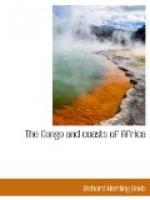The town of Matadi is of importance as the place where, owing to the rapids, passengers and cargoes are reshipped on the railroad to the haut Congo. It is a railroad terminus only, and it looks it. The railroad station and store-houses are close to the river bank, and, spread over several acres of cinders, are the railroad yard and machine shops. Above those buildings of hot corrugated zinc and the black soil rises a great rock. It is not so large as Gibraltar, or so high as the Flatiron Building, but it is a little more steep than either. Three narrow streets lead to its top. They are of flat stones, with cement gutters. The stones radiate the heat of stove lids. They are worn to a mirror-like smoothness, and from their surface the sun strikes between your eyes, at the pit of your stomach, and the soles of your mosquito boots. The three streets lead to a parade ground no larger than and as bare as a brickyard. It is surrounded by the buildings of Bula Matadi, the post-office, the custom-house, the barracks, and the Cafe Franco-Belge. It has a tableland fifty yards wide of yellow clay so beaten by thousands of naked feet, so baked by the heat, that it is as hard as a brass shield. Other tablelands may be higher, but this is the one nearest the sun. You cross it wearily, in short rushes, with your heart in your throat, and seeking shade, as a man crossing the zone of fire seeks cover from the bullets. When you reach the cool, dirty custom-house, with walls two feet thick, you congratulate yourself on your escape; you look back into the blaze of the flaming plaza and wonder if you have the courage to return.
[Illustration: Bush Boys in the Plaza at Matadi Seeking Shade.]
At the custom-house I paid duty on articles I could not possibly have bought anywhere in the Congo, as, for instance, a tent and a folding-bed, and for a license to carry arms. A young man with a hammer and tiny branding irons beat little stars and the number of my license to porter d’armes on the stock of each weapon. Without permission of Bula Matadi on leaving the Congo, one can not sell his guns, or give them away. This is a precaution to prevent weapons falling into the hands of the native. For some reason a native with a gun alarms Bula Matadi. Just on the other bank of the river the French, who do not seem to fear the black brother, sell him flint-lock rifles, as many as his heart desires.
On the steamer there was a mild young missionary coming out, for the first time, to whom some unobserving friend had given a fox-terrier. The young man did not care for the dog. He had never owned a dog, and did not know what to do with this one. Her name was “Fanny,” and only by the efforts of all on board did she reach the Congo alive. There was no one, from the butcher to the captain, including the passengers, who had not shielded Fanny from the cold, and later from the sun, fed her, bathed her, forced medicine down her throat, and raced her




